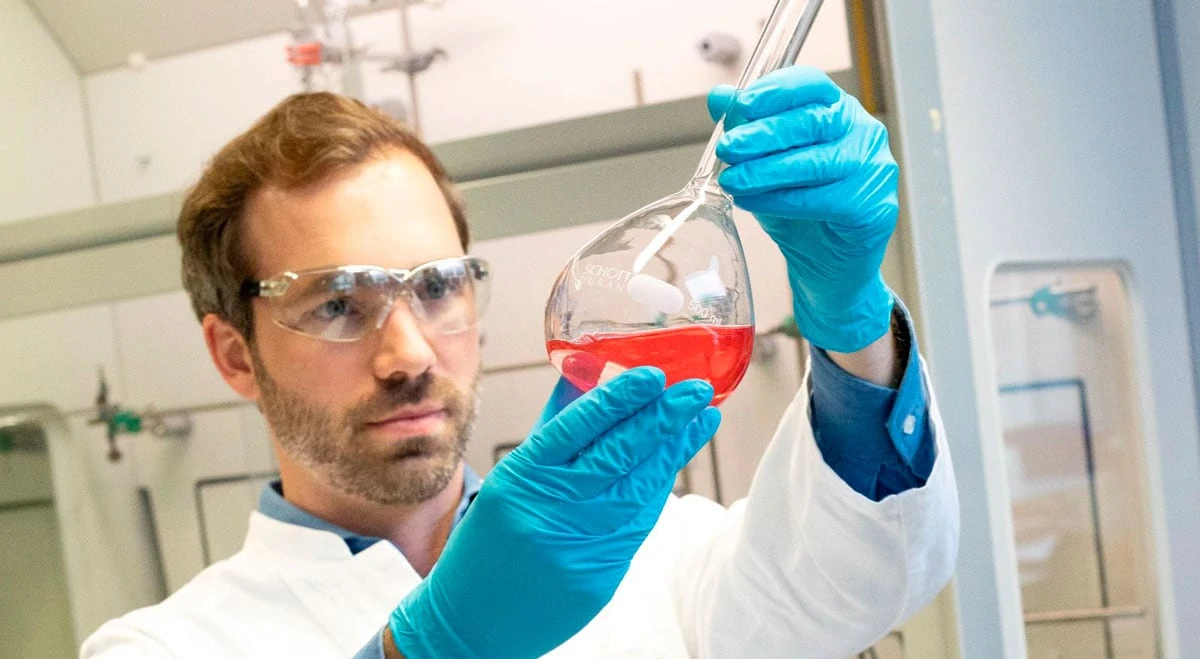Immunic’s IMU-838 is set to enter phase 3 development for the treatment of patients with multiple sclerosis
Recent data confirms IMU-838’s dose response in relapsing-remitting multiple sclerosis; phase 3 program expected to begin in the second half of 2021
April 2021

© Immunic Therapeutics
Immunic scientist in the lab

© Immunic Therapeutics
Dr. Daniel Vitt, CEO; Dr. Hella Kohlhof, CSO; Dr. Manfred Gröppel, COO; Dr. Andreas Mühler, CMO; Immunic Inc. (f.l.t.r.)
“Data thus far continues to convince us that IMU-838 may become an important, new, oral therapeutic option with an outstanding combination of safety, tolerability and robust efficacy for the treatment of patients suffering from RRMS, and we are eager to move ahead with its final clinical development steps.”
Daniel Vitt Ph.D.
Chief Executive Officer and President of Immunic
In April, Immunic Therapeutics, a clinical-stage biopharmaceutical company developing a pipeline of selective oral immunology therapies aimed at treating chronic inflammatory and autoimmune diseases, announced interim data from Cohort 2 of its phase 2 EMPhASIS trial of IMU-838 in relapsing-remitting multiple sclerosis (RRMS). Immunic has concluded from this data, along with previously published data from Cohort 1, that 30 mg once daily IMU-838 is the most appropriate dose for future phase 3 trials in patients with RRMS. In support, Immunic notes that both the 30 mg and 45 mg dosing groups of IMU-838 in Cohort 1 performed equivalently regarding efficacy-related endpoints and there was no safety signal for either dosing group, as compared to placebo.
The second cohort of the EMPhASIS trial was designed to confirm that a dose lower than the 30 mg and 45 mg daily dose groups studied in the first cohort was unlikely to match the efficacy seen in these higher doses, thus enabling a straightforward and simpler phase 3 design. As anticipated, the 10 mg dose of IMU-838 proportionally showed less magnetic resonance imaging (MRI) lesion suppression in RRMS than the previously published results of the 30 mg and 45 mg doses of IMU-838. In particular, the 10 mg dose of IMU-838 in Cohort 2 demonstrated a placebo-adjusted reduction of 32 percent and 40 percent in combined unique active and gadolinium-enhancing MRI lesions at week 12, respectively. This result is numerically lower than the analogous reduction in MRI lesions observed in the 30 mg and 45 mg IMU-838 dosing arms of Cohort 1 at week 12, which ranged between 62 percent and 75 percent. Collectively, Immunic believes that these data demonstrate a clear dose-response pattern for IMU-838 in RRMS. The Cohort 2 interim analysis was performed after 59 randomized patients, receiving either 10 mg of IMU-838 or placebo once daily, completed week 12 MRI assessments. All Cohort 2 patients continue to be treated and will proceed to complete their 24-week blinded treatment.
Immunic remains in discussions with regulatory authorities, including the U.S. Food and Drug Administration (FDA) and the European Medicines Agency, regarding the planned phase 3 program in RRMS. At the FDA’s request, Immunic plans to proceed directly to submitting an Investigational New Drug (IND) application, instead of holding an end-of-phase 2 meeting. As previously announced, feasibility and other preparatory activities for the phase 3 program are already ongoing and initiation is expected in the second half of 2021.
“The positive outcome of the interim analysis of our Cohort 2 sub-trial of IMU-838 in RRMS further strengthens our understanding of the dose-response relationship of IMU-838. The 10 mg interim data and its comparison to the already available 30 mg and 45 mg data provides additional support to address potential regulatory requests in the context of the design and execution of our phase 3 program,” commented Andreas Muehler, M.D., Chief Medical Officer of Immunic. “Based on all available data, we believe that the dose of 30 mg once daily IMU-838 should be considered the most appropriate dose for RRMS patients. While we continue our discussions with major regulatory authorities, we will move ahead with formal phase 3 feasibility activities.”
“Reporting of this Cohort 2 sub-trial analysis, on time and with results fully matching our expectations, is a testament to the strength of our scientific and clinical teams,” stated Daniel Vitt, Ph.D., Chief Executive Officer and President of Immunic. “We look forward to announcing details for the design of our phase 3 program, which we intend to initiate in the second half of this year, as soon as the final regulatory feedback is available. Data thus far continues to convince us that IMU-838 may become an important, new, oral therapeutic option with an outstanding combination of safety, tolerability and robust efficacy for the treatment of patients suffering from RRMS, and we are eager to move ahead with its final clinical development steps.”
85 percent of patients with MS develop relapsing-remitting multiple sclerosis
Multiple sclerosis (MS) is an autoimmune disease that affects the brain, spinal cord and optic nerve. In MS, myelin, the coating that protects the nerves, is attacked and damaged by the immune system. Thus, MS is considered an immune-mediated demyelinating disease of the central nervous system. Relapsing-remitting MS (RRMS) is the most common form of the disease. Approximately 85 percent of patients with MS are expected to develop RRMS, with some of these patients later developing more progressive forms of the disease. RRMS is characterized by clearly defined attacks of new or increasing neurologic symptoms. These relapses are followed by periods of remission, or partial or complete recovery. During remissions, all symptoms may disappear, or some symptoms may continue and become permanent. MS is a progressive disease which, without effective treatment, leads to severe disability. MS affects more than 700,000 people in the United States, and more than 2.2 million people worldwide. The disease mainly affects young adults of prime working age, although MS can occur at any age. MS is at least two to three times more common in women than in men.



